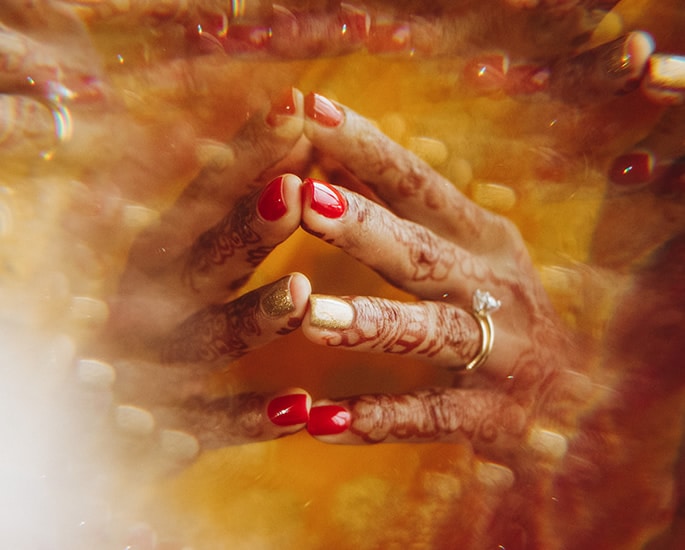In South Asia, it is common practice for a bride’s family to present her husband’s family with money and goods when they are married in the form of a dowry.
Deemed as a wedding gift, the attachment to this innocent offering, however, is never quite that straightforward.
Beneath this offering of gifts as a dowry lies an ugly truth.
Brides and brides-to-be find themselves ensnared in a web of deceit, heartache, horror and even death.
Stories of burning brides, suicides and murder are still prevalent in South Asia even though the Dowry Prohibition Act of 1961 made the giving and receiving of dowry illegal.
The law criminalised demands for dowry and recommended a minimum imprisonment of five years plus a fine equal to the amount of dowry received.
However, dowry continues to be given and received leading to demands which cannot be met by the bride’s side, resulting in many cases of violence, suicide and ultimately death for the bride.
But what about South Asian communities living in the United Kingdom? Is dowry practised amongst them? are things any different for families with daughters in the UK?
We explore these questions further by unveiling real dowry stories in the UK.
DESIblitz talked to women in the UK and discovered that dowry demands are not that uncommon in the west either.
Anita

Anita is divorced. She left her husband five years ago and is now thirty. Her marriage had been arranged when she was just twenty.
“I had no choice in the marriage. It was arranged between the two families. I thought it would be fine.
“He was ok and so were his parents. I wanted to go to university but never got a chance to follow my dream”.
The wedding took place and Anita left her parent’s home to live with the in-laws. They all lived together in the same house.
“My mum and dad did everything they could. I am the oldest of three sisters so they had them to worry about too.
“They had worked hard to save up for the wedding. The usual gifts were given to my in-laws. Gold for all of them and for me and clothes too.
“There were baskets full of dried and fresh fruits and his sisters were given silver jewellery as per the custom”.
The gifts were graciously accepted and nothing more was said. Two weeks passed and Anita says she was happy. Everyone was kind and helped her to settle in.
Then, out of the blue one morning, the mother-in-law made a strange request:
“Beti, we could do with a new TV for the living room. That one is old now. Why don’t you ask your parents if they will buy you one?”
Anita was very much surprised at her mother-in-law’s comment.
“My mouth just dropped open and I sat there dumbfounded and shocked. My husband sat in the same room and said nothing.
“I suggested we buy one as a family. That didn’t go down too well. They just didn’t want to spend any of their own money”.
Anita told her husband that she couldn’t ask her parents for a television. It was absurd. Unfortunately, his views on the subject were different from hers and he turned on her.
“He made my life difficult. He would call me nasty names and said I was a burden on the family.
“Why couldn’t they buy their own bloody telly?”
“Eventually I gave in and asked my parents. They were as shocked as I was. I felt so guilty and sorry for them.
“Not wanting to see me unhappy they bought the telly. I wish I could say that was the end of that but I can’t”.
Anita told us how her in-laws continued to make unrealistic demands month after month.
“They wanted kitchen appliances, dinner sets, bedding and anything they could think of. I realised the only way it would stop was if I was no longer there.
“So I walked. I would rather my parents put up with explaining why I had come home than become penniless because of greedy, ungrateful people”.
Anita divorced her husband and left the marriage due to the dowry demands from a family in the UK being no so dissimilar to those in South Asia.
Jasmin

Jasmin is a forty-three-year-old Punjabi woman who grew up in North London. She was born in the United Kingdom and is the youngest of three.
Jasmin’s parents came to this country when her older brother was just two years old. She also has an older sister.
Being the last to get married, Jasmin’s parents didn’t put any pressure on her. She tells us that she had the freedom to even date before she decided.
“Mum and dad were fine with me going out with boys as long as I was sensible.
“It took the stress off them having to find me a husband.
“I went out with a few men. There was one guy who really struck me as being someone I could relate to. He was down to earth and not at all demanding.
“We talked about our visions and expectations of marriage and agreed on most things. So we decided to tell our parents”.
Jasmin’s parents were happy with her choice and the wedding plans began. Admittedly, he was of a different caste but it wasn’t an issue.
Both families met and talked and agreed on how best to approach the differences in caste during the wedding ceremonies.
Jasmin says of this:
“Everyone was so nice and understanding of each others’ views. Then, completely out of the blue, the mother-in-law made an announcement.
“She blatantly asked for a dowry. A dowry? Can you believe it? In this day and age! Of course, mum and dad would have given what they could have anyway.
“She put a price on her son and wanted Indian gold for this person and that person plus a huge amount of cash as payment for her ‘very educated son with a good job’.
“She claimed that it was their custom and what was expected. Bullshit! Sorry, but custom or no custom I was out”.
We asked Jasmin what her husband to be had to say:
“He was embarrassed but not enough to stand up to his mum.”
“She wore the trousers and the men just went along with what she said.
“This was not the man for me. I wanted someone who would stand by me and up for me. Not some wimp who was scared of his mum”.
Jasmin told him that it wouldn’t work and they went their separate ways. She is grateful to her parents for not blaming her for the break-up. However, she is still single and intends to stay that way.
“People ask my folks all the time why I’m not married yet. They are great and don’t give a damn what anyone thinks. They never push me or question my choices”.
Jasmin’s choice to stay single is her own and she believes a woman can be happy on her own just as much as with a partner.
“I’m enjoying my life and that’s all that matters”.
Jasmin’s story unveils that dowry demands in the UK are deeply rooted in families who still have a firm belief in the practice and even put a value on their son.
Seema

Seema presents a heart-breaking story of extraordinary events in a marriage completely out of place in modern society.
Her downfall was that she fell in love. At only eighteen she went to India with her family and was completely awestruck by Indian culture.
The sights and sounds and bright colours, the street food and markets took her breath away. She says of her experience:
“I loved it. Most kids who go to India for the first time find it disgusting. But for me – it was magical. A whole new world.
“We stayed for three months and in that time I met someone. He was twenty-eight; ten years older and all I knew was that I was in love”.
When the time came to return to England, Seema broke her heart. She didn’t want to leave and told her family why.
They tried to convince her to go back with them and didn’t feel right leaving her alone in another country.
Seema, though, was adamant and nothing would change her mind. Blinded by love for this man, she remained steadfast in her decision.
Reluctantly, her parents met the boy and his family. Wedding arrangements were made very quickly and her family returned to England.
Her husband was a good man, she says. He treated her well and they had a sound relationship.
However, she says:
“His mum took an instant dislike to me. She said I had forced her son into marrying him and that my family had given them nothing.
“In front of other people she was all sweet but as soon as I was alone with her she would start. I was so miserable.
“I didn’t tell my husband because I didn’t want to turn him against his mum. It wasn’t his fault”.
Seema sadly says that the abuse continued based solely around the fact that she hadn’t bought any dowry with her.
“I fell pregnant quite soon which meant I was alone in the house with his mum while he went to work.
“Even the baby made no difference. She simply didn’t like me and used my unborn child to further her abuse.
“She called my baby names; said it would be a leech just like its mum. I became more and more depressed”.
Seema is back in the UK now without a husband or a baby. Her eyes fill with tears as she tells us how she lost her child.
“She pushed me down the stairs. I had just finished hanging a heavy load of washing on the roof and was going back down.
“I will never forgive her what she did. My husband was devastated and angry with me for not telling him.
“We both still love each other but I had to come back home. I am sure we will get back together again somehow”.
Seema is still shocked by her experience and cannot believe that dowry crimes still happen in big modern cities in India.
Sheena

Sheena was at college when her parents requested she go with them to India during the summer holidays. Thinking nothing of it and seeing it as a holiday, she agreed.
They arrived in Chandigarh and stayed with her uncle’s family, who had a modern outlook.
Then one day, they introduced a guy to her, named Tarsem, who was from a family her uncle knew.
“I was a little shocked and wondered if this was a ploy by my parents. They assured me there was no pressure of marriage.”
Surprisingly, both of them were given the freedom to go out and in a way ‘date’ which was not so much the norm.
Tarsem was educated, smart and had a really good sense of humour. Sheena hit it off with him pretty quickly.
“He made me laugh and I really enjoyed his company. The trip suddenly became a romantic affair.”
After a week of spending time with him, Sheena and her family were introduced to his family.
His mother was full of praises for Sheena as to how beautiful she was and how they both were very compatible.
At the time Sheena was smitten by everything going on around her, even if it was so fast.
About another week later, Tarsem asked Sheena if she would consider marrying him. To which she immediately agreed.
“I was in a whirlwind. Everything felt so right. Him, his family and everyone was happy.”
There and then a marriage date was set and the wedding took place and everything seemed too good to be true for Shaheen.
“At the time the in-laws made it clear they wanted no dowry and it was an old fashioned practice.
“We then went on a mini honeymoon to visit a few cities in Punjab and we then arrived back at his home to stay with his family.
“It was at this time when things began to not look so rosy. His mum was all nice and over the top with me but then began to hint at a lack of gifts given at the wedding.
“She said although they said no dowry, it did not mean her parents would give ‘nothing’.”
“She complained that my parents gave me gold at the wedding and them no jewellery.”
Shaheen was hugely saddened by this and disgusted by the two-faced appearances her mother-in-law continued to display. Especially, in front of her parents.
The demands from her got worse and when Sheena told Tarsem, he did not want to say anything against his family and brushed it off as a ‘woman’s thing’.
Behind his back, his mother began to make Sheena’s life miserable.
“She kept on having digs at me, my family and that although we were from the UK, it was an insult not to have given gifts, in other words, a dowry.”
Sheena told her parents eventually. Her uncle got involved as well. Sadly, a huge row and argument over the whole issue led to this very short marriage ending.
Sheena in many ways was relieved.
“I’m glad it all happened in the way it did. My parents feel very sad for me. But I am relieved. Imagine, if I had called him over to the UK and this carried on? I think I was lucky.”
Sheena went on to finish her studies and go to university.
Kamal

Kamal is a survivor; a woman made strong by the events that changed her life.
She is an educated young woman who suffered brutally at the hands of her in-laws but lives to tell the tale.
Kamal was twenty-four when her marriage was arranged. Her in-laws made no dowry demands at the time of the wedding or before it.
However, after only a couple of months, things started to change. Large amounts of money and gold were demanded from Kamal.
She says her father paid up because he didn’t want her to bear the brunt.
“It didn’t just stop there. The demands continued until dad couldn’t afford it anymore.”
“That’s when my life became hell.
“Even my own husband was in on it. He said if I didn’t get the money he needed he would make me pay.
“I couldn’t ask my dad again and I told them I wouldn’t. My mother-in-law and husband both beat me while the dad stood and watched them”.
Kamal was told that she was a burden on the family and that her husband had only married her so that he could be better off financially.
“Each time I refused to ask my dad they would hit me. The beatings got worse while my husband abused me verbally and sexually too.
“Every time he wanted to have sex and I declined, he would force himself on me. Anywhere else this would be called rape”.
Kamal told us that she had an older sister-in-law who she could turn to for support. She came from a very wealthy family and they had been able to fulfil the demands.
Kamal is very angry and says:
“Just because you come from a wealthy family it doesn’t automatically make you a target for ridiculous dowry demands.
“My sister-in-law gave in but never found happiness in her marital home. She was the only one who was good to me and literally saved my life.
“I knew if I stayed I would die; either at their hands or by suicide. My sister-in-law helped me to plan my exit and I was able to leave”.
This is the sad story of a woman living in a so-called modern society where dowry-related atrocities seem so out of place.
Nevertheless, they continue to exist. The perpetrators get away with it because, often, the victim is too afraid to call the police or go to their own parents for help.
The cruel fact of the matter is that this is allowed to happen. Help is always available but the victim must first find the courage and strength to cry out.
Southall Black Sisters (SBS) is an organisation which supports women trapped in domestic violence and abusive relationships.
Domestic violence, no matter what the cause, is a crime and SBS provide several methods of making contact with someone who can help.
Making a stand and crying out for help is not as simple as it sounds but it is the only to bring about change.
Dowry is outdated and wrong regardless of whether the law says it is illegal or not. As far back as 1961, it was made illegal in India though it has never been enforced.
People need to change with the times and make marriage a union of love and trust and not one of financial gain from the bride’s family.
If you are suffering from dowry abuse, contact the police if you are in danger or any of the following organisations for help.
Women’s Aid
Refuge
English National Domestic Violence Helpline
Source link Breaking News
The post Real Stories: Marriage and Giving a Dowry in the UK appeared first on Viral Trending Content.
from WordPress https://ift.tt/2NlyrmF
via IFTTT
Comments
Post a Comment